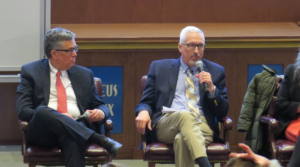New Hampshire Democratic Debate Recap

Courtesy of The New York Times
By Anna Harvey
The New Hampshire Democratic Debate took on a new sense of importance with the quickly approaching New Hampshire primary on February 11.
The debate took place at Saint Anselm College in Manchester, New Hampshire on February 7, and featured Democratic candidates Andrew Yang, Mayor Pete Buttigieg, Senator Bernie Sanders, former Vice President Joe Biden, Senator Elizabeth Warren, Senator Amy Klobuchar, and Tom Steyer. For low-polling candidates such as Yang and Steyer, a good debate performance was of the utmost necessity, as recent DNC Polling and delegate thresholds must now be met in order to qualify for the Nevada Democratic Debate on February 19.
Topics discussed in the New Hampshire debate included healthcare, Supreme Court justice nominations, the Iran airstrike, the war in Afghanistan, decriminalization of drugs, gun control, and climate change.
The debate started with a question directed towards Biden on whether the Democratic party suffers any risks with having any particular candidates on the party ticket. Biden and the rest of the candidates skirted these insinuations at Sanders’ socialist standings and Buttigieg’s lack of experience, and they instead focused on party unity and attracting a larger voter turnout.
Throughout the rest of the debate, however, questions continually returned to Buttigieg and his lack of experience in federal government. Despite his answers weakening by the end of the debate, for the majority of these questions, he answered readily, stating on healthcare, “We’ve got to be ready to move on from the playbook we’ve used in the past.”
A notable prediction came from Biden at the beginning of the debate when he stated “I took a hit in Iowa and I’ll probably take a hit here,” indicating that he would not do well in the New Hampshire primary. Furthermore, while he frequently drew upon his own experiences and initiatives during office, he never attempted to rectify his initial prediction over the course of the debate.
On the other hand, Sanders and Klobuchar both performed particularly well throughout the night. Sanders placed 2nd for speaking time out of all the candidates, and Klobuchar landed several well-worded attacks on Buttigieg, her top opponent on the Democratic ticket. In terms of talking time, however, Klobuchar placed just above Warren, who emerged from the debate with neither great gains nor losses.
For both Yang and Steyer, the New Hampshire debate proved to be fairly incriminating, as both candidates tanked in speaking time. While Steyer often went on the offensive, particularly in criticizing Buttigieg, he did not firmly argue his own positions on policy. Similarly to Steyer, Yang did not introduce new viewpoints to the debate, but rather kept returning to the concept of putting money in the hands of American families, which supports his frequently-toted plan of giving $1,000 a month to every adult over 18.
While the candidates addressed topics such as balancing the Supreme Court and uniting as a party to beat Trump, they did not directly address Trump’s impeachment. Some candidates made veiled remarks, such as Buttigieg, when he asserted to the audience, “If the Senate was the jury before, you are the jury now.” Despite these remarks, however, the candidates did not actively dissect the impeachment proceedings, but rather added it into their arsenal of weapons against Trump and his administration.
Looking to the next Democratic debate in Nevada, each of the candidates now must meet the DNC’s qualification criteria, which involves meeting a delegate and polling threshold. To meet the delegate threshold, according to the DNC’s website, “candidates must have been allocated at least one pledged delegate to the Democratic National Convention,” from either the Iowa caucus or the New Hampshire primary. To meet the polling threshold, the candidates must meet either the four-poll threshold or the early state polling threshold. For candidates such as Sanders or Buttigieg, who performed well in the Iowa caucus, these qualifications may not be terribly hard to meet. For low-polling candidates such as Steyer and Yang, however, the New Hampshire primary following the New Hampshire debate may prove to either make or break these candidates’ chances of qualification.







